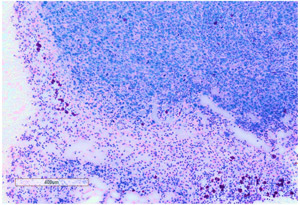Newsroom
UBC researchers discover how cancer’s ‘invisibility cloak’ works
 UBC researchers have discovered how cancer cells become invisible to the body’s immune system, a crucial step that allows tumours to metastasize and spread throughout the body.
UBC researchers have discovered how cancer cells become invisible to the body’s immune system, a crucial step that allows tumours to metastasize and spread throughout the body.
“The immune system is efficient at identifying and halting the emergence and spread of primary tumours but when metastatic tumours appear, the immune system is no longer able to recognize the cancer cells and stop them,” said Wilfred Jefferies, senior author of the study working in the Michael Smith Laboratories and a professor of Medical Genetics and Microbiology and Immunology at UBC.
“We discovered a new mechanism that explains how metastatic tumours can outsmart the immune system and we have begun to reverse this process so tumours are revealed to the immune system once again.”
Cancer cells genetically change and evolve over time. Researchers discovered that as they evolve, they may lose the ability to create a protein known as interleukein-33, or IL-33. When IL-33 disappears in the tumour, the body’s immune system has no way of recognizing the cancer cells and they can begin to spread, or metastasize.
The researchers found that the loss of IL-33 occurs in epithelial carcinomas, meaning cancers that begin in tissues that line the surfaces of organs. These cancers include prostate, kidney breast, lung, uterine, cervical, pancreatic, skin and many others……
To read the complete article, visit UBC Public Affairs
Iryna Saranchova, Jeffrey Han, Hui Huang, Franz Fenninger, Kyung Bok Choi, Lonna Munro, Cheryl Pfeifer, Ian Welch, Alexander W. Wyatt, Ladan Fazli, Martin E. Gleave, Wilfred A. Jefferies.
Discovery of a Metastatic Immune Escape Mechanism Initiated by the Loss of Expression of the Tumour Biomarker Interleukin-33. Scientific Reports, 2016; 6: 30555 DOI: 10.1038/srep30555